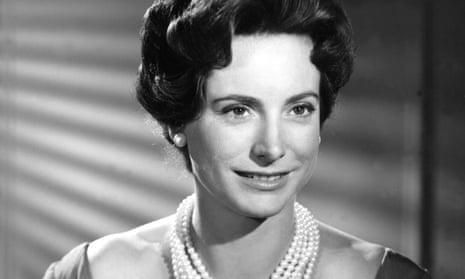In 1960 Nan Winton, who has died aged 93, became the first woman to read the national television evening news on the BBC. She began in June that year, but after a few weeks, “Newsgirl Nan” was dropped. She was then reinstated and finally removed in March 1961. Britain was on the brink of the 1960s social revolution, but the BBC was behind the curve.
Winton was called in to the office of the senior television executive Michael Peacock to receive the news, as she recalled in 1964 in an interview with the Daily Mail. “He didn’t say why, explain anything, he was a cold man. I was furious,” she said. “I suffered at the time, I believe there is certainly discrimination against women in this country. There were times when I was doing the announcing when I wanted to shout aloud, like Shylock, ‘Hath not woman eyes, ears, senses?’”
An independent and confident woman, she had not realised what a revolutionary thing (at least in the eyes of the BBC) she had been asked to do. According to the corporation, audience reaction indicated that women were considered too frivolous to read serious news, and that objectivity was associated with masculinity.
“I didn’t have any trouble from the press or the public,” Winton said. “It was the editorial staff who were a bit dodgy.” She linked this to the middle-aged, male-dominated newsroom culture of Fleet Street which many had been shaped by. Her daughter Tina said her mother viewed the year in the BBC newsroom as the unhappiest of her life.
The Shylock quote was key to Winton’s character. Her poise and well-modulated voice were those of a trained actor. She had won a place at the Royal Academy of Dramatic Art after touring around Italy in the immediate postwar years with a theatre company. The BBC spotted her talent when she was presenting live sessions at the Ideal Home Exhibition to supplement her acting. She was a tall, dark-haired, glamorous woman, who could don a cocktail dress, or tweed suit and pearls, with equal panache.
She built up a broadcast career from the mid-50s, notably co-presenting Information Desk, answering viewers’ questions, Mainly for Women, a daytime magazine programme, continuity announcing between 1958 and 1961, and assorted radio slots, leading up to presenting Panorama, and the Sunday night news experiment. These brought her bundles of fan mail. One of her skills was drawing people out – she was particularly pleased to conduct an interview with the rising Labour star Barbara Castle in 1961.
The move to newsreading had been a BBC response to the more dynamic and populist approach of ITV’s news, which had deployed Barbara Mandell since its launch in 1955. It was not until 1975 that the BBC employed a regular female national news presenter in Angela Rippon.
Winton transferred her efforts into a range of radio shows, most prominently working in the 1970s as a panellist alongside Ted Moult and Neil Durden-Smith on the quiz show Forces’ Chance, which visited troops stationed overseas in Malta, Cyprus, Germany and Northern Ireland as part of the British Forces Broadcasting Service and was also broadcast on Radio 4.
Winton was born Nancy Wigginton in Portsmouth, the youngest of four children of Frank, a surveyor, and Evelyn (nee Nurse), a housewife. She left school at 15, after her mother died, in order to run the household. The second world war shaped her teenage years, and she joined the Women’s Land Army, becoming a drill sergeant. After the armistice she became part of a touring actors’ group entertaining the troops: visiting Italy and tasting ripened peaches for the first time began a lifelong love of the country, especially Naples.
After Rada, in 1948 she married the actor Charles Stapley, who later played Ted Hope in the soap Crossroads. They had a son, Stephen, and daughter, Tina. The marriage was dissolved in 1962, and Nan singlehandedly brought up the children in homes in Notting Hill and Richmond, London, where she was renowned for her hospitality.
She diversified into a number of jobs, including working for MGM PR out of Pinewood Studios as well as becoming the founding general secretary in 1968 of the Association of Fashion, Advertising and Editorial Photographers (now the Association of Photographers), which protects photographers’ rights. She later lent her expertise to help set up the Association of Illustrators and the British Association of Picture Libraries. Her ability to host events and deal with a range of people came to the fore.
She served until 1982 as general secretary of the Anglo-Israel Association. Then she moved to Dorset in search of a more peaceful life. She eventually settled in Bridport, enjoying a long, active retirement, gardening, reading, travelling and keeping up with politics and family.
She is survived by her children, and a grandson, Galan.

Comments (…)
Sign in or create your Guardian account to join the discussion